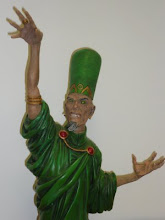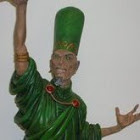A very engaging biography of a fascinating man who has the extraordinary ill luck to be vilified by by two great English poets in stunning memorable ways. The words of the poets, Byron and Shelly, captured a very vivid strain of popular comment about Robert Stewart, Lord Castlereagh, as a brutal reactionary and a lackluster, second rate political schemer. John Bew scrapes the mud off to take a more considered look at Castlereagh and to evaluate his very considerable achievements.
The most important point about Castlereagh is that he was the right person in the right place at the right time, he had a willingness and capacity to do what had to be done for the horribly mundane reasons of political and social necessity at the time regardless of the the current intellectual climate. Castlereagh was an Ulster Presbyterian, brought up in an Enlightenment tradition of political liberalism that was the bedrock support for the development of self-governing Ireland. That he was vital to to the success of the Act of Union which removed the Irish Parliament was a breach with his original social and political community in Ireland that never healed. One of the most striking aspects to the change by Castlereagh and one of the defining characteristics of his life that Jhn Bew effectively brings out, is that the breach was not an intellectual bonfire or conversion by Castlereagh. It was much worse than that as far as his former colleagues were concerned, they would have been much more forgiving of a romantic conversion to another faith. Instead it was a simple understanding that the current situation would not stand. A change was going to come and Castlereagh, as he was to do all his life, worked to bring it about peacefully rather than wait for an explosion.Castlereagh was to suffer all his life from a determination to adhere to the bruising details of reality and to push actions based on that rather than on the flavorsome ideals that his contemporaries enjoyed so much.
Following the demise of the Irish Parliament Castlereagh was elected to the House of Commons, this process in itself is a wonderful drama of politics and patronage, and became a member of Tory Party led by William Pitt. The Napoleonic wars were being fought and in England there was considerable support for Napoleon as the heir of the French Revolution and the idea (if not the substance) of Liberty. As Secretary of War, Castlereagh lead a determined political campaign to defeat Napoleon and to support British national interests. He was a vital support for Wellington and became one of the most influential people in Europe at the Congress of Vienna after Napoleon's first defeat and exile.After the Battle of Waterloo the post-war economic depression and civil disturbances cemented his reputation as a blood stained reactionary. His eventual suicide was greeted with scarstic pleasure by his most determined, Irish, enemies.
Castlereagh's biggest problem was his greatest strength, he was a technocrat who was significantly more concerned about the process than the city on the hill, he was a competent speaker at a time when ability with rhetoric was highly prized and most of all his greatest successes were what had not happened. The Irish Parliament did not implode under the weight of its own entitled, corrupt incompetence, Napoleon did not strangle Britain, Europe did not fall apart in a post-Napoleonic series of wars between Austria and Russia. It is very hard to get get credit for an invisible success.
One of the most interesting aspects to the book is also something invisible and that is the impact of the fact that Castlereagh was Irish and dominant in an English institution. Castlereagh was vilified to an extraordinary extent by his opponents even by the standards of the time and it would seem reasonable to trace some of the outrage to offended pride. Being lead by someone who would be considered a social, political and racial inferior was very likely a factor in the extremity of the response he provoked. John Bew never address the question in any sort of detail which is a loss to a very fine study. John Bew is a first rate writer, he brings the details of the time to life with care and clarity and in doing so reveals an extraordinary and ultimately, very attractive, man.
The most important point about Castlereagh is that he was the right person in the right place at the right time, he had a willingness and capacity to do what had to be done for the horribly mundane reasons of political and social necessity at the time regardless of the the current intellectual climate. Castlereagh was an Ulster Presbyterian, brought up in an Enlightenment tradition of political liberalism that was the bedrock support for the development of self-governing Ireland. That he was vital to to the success of the Act of Union which removed the Irish Parliament was a breach with his original social and political community in Ireland that never healed. One of the most striking aspects to the change by Castlereagh and one of the defining characteristics of his life that Jhn Bew effectively brings out, is that the breach was not an intellectual bonfire or conversion by Castlereagh. It was much worse than that as far as his former colleagues were concerned, they would have been much more forgiving of a romantic conversion to another faith. Instead it was a simple understanding that the current situation would not stand. A change was going to come and Castlereagh, as he was to do all his life, worked to bring it about peacefully rather than wait for an explosion.Castlereagh was to suffer all his life from a determination to adhere to the bruising details of reality and to push actions based on that rather than on the flavorsome ideals that his contemporaries enjoyed so much.
Following the demise of the Irish Parliament Castlereagh was elected to the House of Commons, this process in itself is a wonderful drama of politics and patronage, and became a member of Tory Party led by William Pitt. The Napoleonic wars were being fought and in England there was considerable support for Napoleon as the heir of the French Revolution and the idea (if not the substance) of Liberty. As Secretary of War, Castlereagh lead a determined political campaign to defeat Napoleon and to support British national interests. He was a vital support for Wellington and became one of the most influential people in Europe at the Congress of Vienna after Napoleon's first defeat and exile.After the Battle of Waterloo the post-war economic depression and civil disturbances cemented his reputation as a blood stained reactionary. His eventual suicide was greeted with scarstic pleasure by his most determined, Irish, enemies.
Castlereagh's biggest problem was his greatest strength, he was a technocrat who was significantly more concerned about the process than the city on the hill, he was a competent speaker at a time when ability with rhetoric was highly prized and most of all his greatest successes were what had not happened. The Irish Parliament did not implode under the weight of its own entitled, corrupt incompetence, Napoleon did not strangle Britain, Europe did not fall apart in a post-Napoleonic series of wars between Austria and Russia. It is very hard to get get credit for an invisible success.
One of the most interesting aspects to the book is also something invisible and that is the impact of the fact that Castlereagh was Irish and dominant in an English institution. Castlereagh was vilified to an extraordinary extent by his opponents even by the standards of the time and it would seem reasonable to trace some of the outrage to offended pride. Being lead by someone who would be considered a social, political and racial inferior was very likely a factor in the extremity of the response he provoked. John Bew never address the question in any sort of detail which is a loss to a very fine study. John Bew is a first rate writer, he brings the details of the time to life with care and clarity and in doing so reveals an extraordinary and ultimately, very attractive, man.



No comments:
Post a Comment